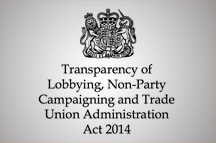 The three trade associations have together called for clarification from the Government over the new statutory register of lobbyists, so that potential registrants are able to comply with the law. The concerns expressed by the PRCA, CIPR and APPC are surrounding the nature of activity that triggers the requirement to register, and the cost of registration. The release reads: “By excluding all in-house lobbyists, and only triggering registration when a select group of policy-makers are lobbied, the result is that only a small fraction of lobbyists and policy-makers will be included in the statutory register, meaning the cost of registration risks being prohibitive.”
The three trade associations have together called for clarification from the Government over the new statutory register of lobbyists, so that potential registrants are able to comply with the law. The concerns expressed by the PRCA, CIPR and APPC are surrounding the nature of activity that triggers the requirement to register, and the cost of registration. The release reads: “By excluding all in-house lobbyists, and only triggering registration when a select group of policy-makers are lobbied, the result is that only a small fraction of lobbyists and policy-makers will be included in the statutory register, meaning the cost of registration risks being prohibitive.”
The statement continues to praise the Act’s acknowledgement of existing industry codes, with consultancies captured by the register required to declare whether they are currently enrolled. “However, despite the Government’s assurances, it is not clear how this will support existing voluntary registers, such as the UKPAC, APPC, CIPR and PRCA registers, which currently provide more information about lobbying than the Statutory Register will.”
All three associations have expressed their intent to work closely with the Cabinet Office in the coming months to ensure the concerns of their members are expressed and to address any “complexities and ambiguities” that arise during the development and implementation of the register.
 PRCA Director General Francis Ingham said: "Professional, ethical lobbyists have nothing to fear from transparency. In fact, for the last two decades, our industry has embraced higher levels of disclosure on lobbying activities than the Government now proposes. We welcome the fact that the Government has conceded in several key areas, most notably ensuring that the register will detail where lobbyists do or do not subscribe to existing industry codes of conduct. Nonetheless this is not an Act which will stand the test of time. By excluding in-house teams, the Government guarantees that its successor will have to revisit this issue. And the PRCA will help its successor to do just that.”
PRCA Director General Francis Ingham said: "Professional, ethical lobbyists have nothing to fear from transparency. In fact, for the last two decades, our industry has embraced higher levels of disclosure on lobbying activities than the Government now proposes. We welcome the fact that the Government has conceded in several key areas, most notably ensuring that the register will detail where lobbyists do or do not subscribe to existing industry codes of conduct. Nonetheless this is not an Act which will stand the test of time. By excluding in-house teams, the Government guarantees that its successor will have to revisit this issue. And the PRCA will help its successor to do just that.”














